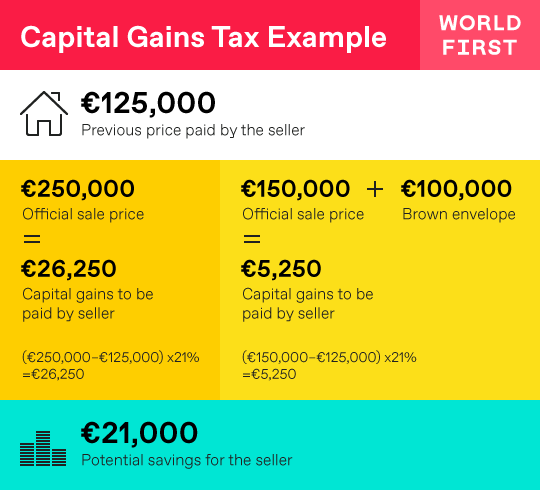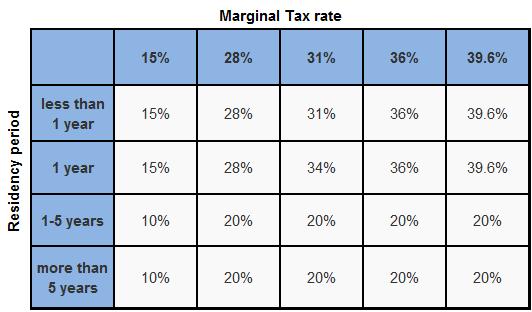Table Of Content

If you hold rental property, the gain or loss when you sell is generally characterized as a capital gain or loss. If held for more than one year, it's long-term capital gain or loss and if held for one year or less, it's short-term capital gain or loss. The gain or loss is the difference between the amount realized on the sale and your tax basis in the property. It’s also important to know the type of asset you’re dealing with. While most long-term capital gains are taxed at rates of up to 20% based on income, there are situations in which higher rates apply.
How does capital gains tax on real estate work?
Let's say you receive a job transfer and must sell your home 10 months after buying it. If you manage to sell it for more than you bought it for, you can reduce that profit by the amount it cost to acquire the home, plus any improvements you made that added value during the 10 months you were there. Depending on those two expenses, you may even avoid paying short-term gains.
'It's chaos': Cottage owners rush to sell ahead of capital gains tax changes, realtors say - The Globe and Mail
'It's chaos': Cottage owners rush to sell ahead of capital gains tax changes, realtors say.
Posted: Wed, 24 Apr 2024 22:46:41 GMT [source]
Do You Have to Pay Capital Gains Tax on Real Estate?
Unlike short-term gains, long-term gains are subject to preferential capital gains tax rates. This involves conforming to the two-in-five-year rule (you lived in it for a total of two of the past five years). Put simply, you can prove that you spent enough time in one home that it qualifies as your principal residence. Being classified as an investment property, rather than as a second home, affects how it’s taxed and which tax deductions, such as mortgage interest deductions, can be claimed. Under the Tax Cuts and Jobs Act (TCJA) of 2017, up to $750,000 of mortgage interest on a principal residence or vacation home can be deducted.

Rental Property
Here's what you need to know about the increased capital gains tax - Financial Post
Here's what you need to know about the increased capital gains tax.
Posted: Fri, 19 Apr 2024 07:00:00 GMT [source]
For example, you purchased a house for $250,000 and later experienced a loss from a fire. Your home insurer issues a payment of $100,000, reducing your cost basis to $150,000 ($250,000 original cost basis - $100,000 insurance payment). Homeowners can avoid paying taxes on the sale of a home by reinvesting the proceeds from the sale into a similar property through a 1031 exchange. This like-kind exchange—named after Internal Revenue Code Section 1031—allows for the exchange of like property with no other consideration or like property including other considerations, such as cash. The 1031 exchange allows for the tax on the gain from the sale of a property to be deferred, rather than eliminated. Mutual funds that accumulate realized capital gains throughout the tax year must distribute these gains to shareholders.
When calculating the holding period—or the amount of time you owned the asset before you sold it—you should count the day you sold the asset but not the day you bought it. For example, if you bought an asset on February 1, 2023, your holding period started on February 2, 2023, the one-year mark of ownership would occur on February 1, 2024. LITCs represent individuals whose income is below a certain level and who need to resolve tax problems with the IRS. LITCs can represent taxpayers in audits, appeals, and tax collection disputes before the IRS and in court. In addition, LITCs can provide information about taxpayer rights and responsibilities in different languages for individuals who speak English as a second language.

The amount you owe in capital gains taxes depends in part on how long you owned the asset. Long-term capital gains taxes are paid when you’ve held an asset for more than one year, and short-term capital gains apply to profits from an asset you’ve held for one year or less. However, the IRS gives home sellers multiple ways to avoid or reduce their capital gains taxes, principally if their property is a primary residence. You can exempt a certain amount of the profit — up to $250,000 or $500,000, depending on your filing status — from the tax if you meet certain conditions.
The tax rates for long-term capital gains are consistent with the trend to capital gains being taxed at lower rates than individual income, as this table demonstrates. However, there are expenses to account for, including the capital gains tax. A short-term gains tax will likely result in a higher tax rate, though. So, it may be worthwhile to hold on to a property long enough to qualify for the long-term gains tax.
If you qualify, the primary residence exclusion can exempt as much as $500,000 of net profit from capital gains tax for married couples filing jointly, or $250,000 for all other taxpayers. So if your cost basis on your home that you own jointly with your spouse is $400,000 and you eventually sell it for $900,000, the IRS can't touch a penny of your gains. It's only when you exceed $500,000 in net profit that the proceeds will be taxed. A net capital gain may be subject to a lower tax rate than the ordinary income tax rate. Your long-term capital gains can be taxed at 0%, 15%, 20%, or 25% These are the same rates as in 2023. The rate at which your gains are taxed will depend on your income, filing status, and the type of asset.
Income Tax (I-T) Act 1961 allows taxpayers to claim tax exemption of LTCG under section 54F. Under this provision, if you have earned gains by selling an asset, you can claim exemption on tax by buying a residential property. If you're reading about capital gains, it probably means your investments have performed well. If the FMV of the property at the time the donor made the gift is less than the donor's adjusted basis, your adjusted basis depends on whether you have a gain or loss when you dispose of the property.
Determine whether any of the automatic disqualifications apply. Joy is an experienced CPA and tax attorney with an L.L.M. in Taxation from New York University School of Law. After many years working for big law and accounting firms, Joy saw the light and now puts her education, legal experience and in-depth knowledge of federal tax law to use writing for Kiplinger. She writes and edits The Kiplinger Tax Letter and contributes federal tax and retirement stories to kiplinger.com and Kiplinger’s Retirement Report. Her articles have been picked up by the Washington Post and other media outlets. Joy has also appeared as a tax expert in newspapers, on television and on radio discussing federal tax developments.
If you sell a house that you didn’t live in for at least two years, the gains can be taxable. Selling in less than a year is especially expensive because you could be subject to the short-term capital gains tax, which is higher than the long-term capital gains tax. If you’re opting out of the rental property investment business and putting your money in another venture that does not qualify for the 1031 exchange, then you’ll owe the capital gains tax on the profit.

No comments:
Post a Comment